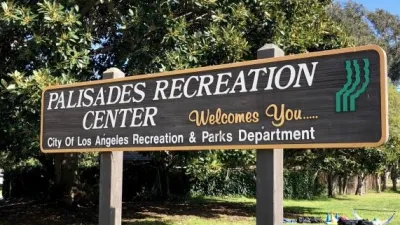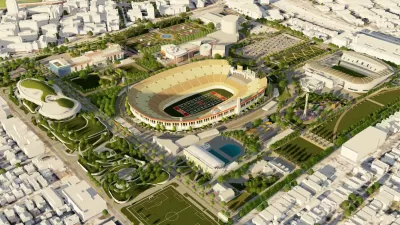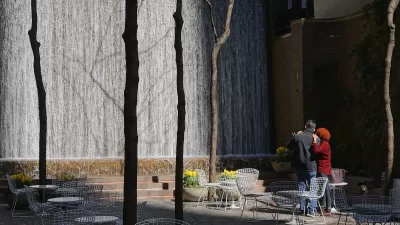After a tour of Los Angeles street furniture, Alissa Walker offers her reflections on cities' changing approach to public space.
"Thanks to some smart approaches to the way our streets are being redesigned, cities are slowly moving beyond the 'have a seat, but not for too long' mentality," writes Alissa Walker for Curbed. That mentality includes the "defensive" architecture and design that particularly targets homeless people.
Although homelessness has increasing consideration state- and nationwide, Walker posits that L.A.'s new generation of street furniture comes as a response to renewed interest in bike and pedestrian infrastructure. She writes:
This means a whole new way of thinking about how people can enjoy these spaces. Goodbye to bolted, cement-slathered seating; hello to lightweight benches, moveable planters, beach umbrellas, and cheap cafe tables and chairs—all of which can be repositioned by users.
The lightweight, "nimble" pieces reflect an approach to streetscape improvement where low-capital projects that can be easily altered or removed based on their success:
The parklets and plazas that are starting to pop up on urban streets are often pilot projects—tiny street corners carved out with temporary decking materials or, in some cases, just a different color of paint... "We like to collect data to learn from the projects and actually tweak them to evolve them," says Valerie Watson, LADOT’s assistant pedestrian coordinator.
Walker also notes that these projects are often implemented and maintained through public-private partnerships, allowing innovations like smart furniture to be sited more equitably throughout neighborhoods.
Walker notes that these projects are often done through public-private partnerships, which can allow innovations like smart furniture to be sited more equitably throughout neighborhood—although recently, a failed partnership cost Los Angeles more than 800 bus shelters throughout the city.
FULL STORY: Seats in the street: How LA's outdoor furniture creates a more livable city

Alabama: Trump Terminates Settlements for Black Communities Harmed By Raw Sewage
Trump deemed the landmark civil rights agreement “illegal DEI and environmental justice policy.”

Study: Maui’s Plan to Convert Vacation Rentals to Long-Term Housing Could Cause Nearly $1 Billion Economic Loss
The plan would reduce visitor accommodation by 25% resulting in 1,900 jobs lost.

Planetizen Federal Action Tracker
A weekly monitor of how Trump’s orders and actions are impacting planners and planning in America.

Grand Rapids Mayor Proposes Garage Conversion Plan
The mayor says allowing homeowners to convert garages to dwelling units could alleviate the city’s housing shortage.

Baltimore Ordered to Improve Sidewalk Accessibility
The city is one of many to face lawsuits for failing to comply with the Americans with Disabilities Act.

This Toronto Suburb Has More Bus Riders Than Columbus, Ohio
Brampton, Ontario used gradual improvements in service to prove that if you build it, they will ride.
Urban Design for Planners 1: Software Tools
This six-course series explores essential urban design concepts using open source software and equips planners with the tools they need to participate fully in the urban design process.
Planning for Universal Design
Learn the tools for implementing Universal Design in planning regulations.
Smith Gee Studio
Alamo Area Metropolitan Planning Organization
City of Santa Clarita
Institute for Housing and Urban Development Studies (IHS)
City of Grandview
Harvard GSD Executive Education
Toledo-Lucas County Plan Commissions
Salt Lake City
NYU Wagner Graduate School of Public Service





























